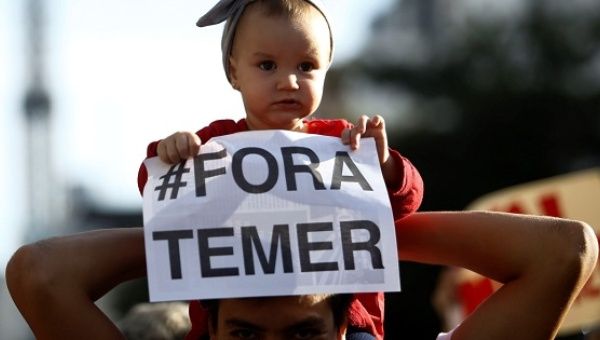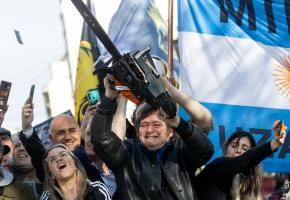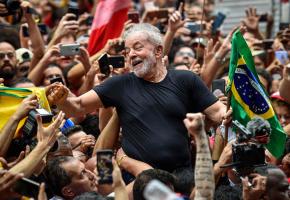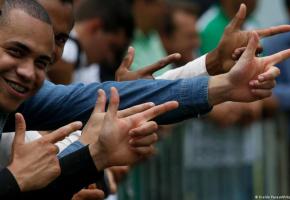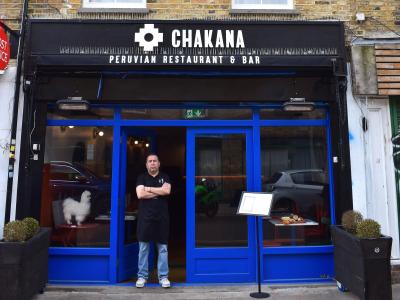Temer is caught in a tangle resulting from the last decade of political history. Elevated to the position of Congressional President then Vice President of the Republic, Temer was a key actor in the coalition between Lula’s PT (Partido dos Trabalhadores/Workers’ Party) and the PMDB (Partido do Movimento Democratico do Brasil/ Brazilian Democratic Movement Party), a centre-right party –one of the country’s largest– that was created at the end of the military dictatorship.
After the so-called “mensalão” scandal, which brought down historic leaders of the PT, Lula chose to bet on names outside of traditional party politics to guarantee continuity of the PT’s development project within the Federal Government. This is one of the reasons he chose Dilma Rousseff, his Chief of Staff, relatively unknown in political circles, to be his successor to the presidency. Although she had never run for any political office before, she was able in the 2010 election to beat decisively José Serra from the PSDB (Partido da Social Democracia Brasileira/Brazilian Social Democratic Party).
The mensalão scandal of 2005 forced Lula to consolidate an alliance with the PMDB party. During the early 1980s, the PMDB rose from the ashes of the MDB (Movimento Democratico do Brasil/Brazilian Democratic Movement), a party created during the military dictatorship to house the official government opposition in order to create a two-party system and provide a semblance of democracy. As the dictatorship ended, however, the PMDB showed that it wasn’t really an opposition after all, as it welcomed important names from the official dictatorship party ARENA (Aliança Renovadora Nacional/National Renovating Alliance) like José Sarney. Sarney unexpectedly became president for the full 5-year term after Tancredo Neves, the first civilian indirectly elected after the dictatorship ended in 1985, died before he could take office. The PMDB absorbed a large part of the political structure of coronelismo, the old tradition of regional political machines run by plantation owners and ranchers, as well as a strong block of senators and congressmen.
As Lula lost the support of a patchwork of smaller, centrist parties during the mensalão scandal, and with the dissolution of his Vice President and business community intermediary José Alencar’s PL (Partido Liberal/Liberal Party), he decided to reach out to the PMDB. At that time, the PMDB was a key member of Fernando Henrique Cardoso’s PSDB coalition, having provided the Vice Presidential candidate for José Serra in 2002.
The Lava Jato investigations now show that the PMDB was the primary beneficiary and often the creator of the corruption schemes within Petrobras petroleum company and other parastatal corporations. Michel Temer and Congressional leader Eduardo Cunha (now removed from the post and in prison) tried to grab whatever they could, and for a while everything went well. Brasilia’s political establishment never liked Dilma Rousseff, and her elevation to the presidency bothered them. They viewed her as an incorruptible centralizer and, during her first term, she put an end to several corruption schemes, firing all ministers she believed to be involved in any type of scandal.
When a recession hit in early 2014, caused by factors including massive corporate tax breaks, an overvalued exchange rate, a fall in commodity prices and, importantly, paralysation of a large part of the construction and petroleum sectors directly caused by the Lava Jato investigation and the resultant hundreds of thousands of lay-offs. The opposition took advantage of the moment and, led by Eduardo Cunha, generated a political crisis that was supported by the most conservative Congress Brazil had seen since 1964. As the president’s popularity fell in step with economic indicators, the idea took hold that her impeachment would be the solution for the country’s problems. Despite the trouble brewing, Dilma continued to depend on the PMDB to back her up. It was a sweet illusion.
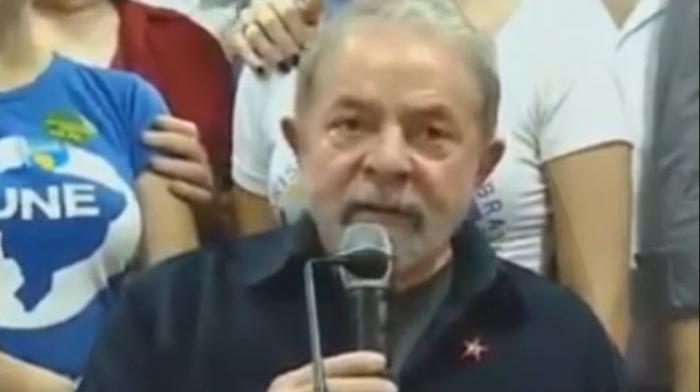 Lula speaking after sentence for alleged corruption in relation to a flat in the beach resort of Guaruja, São Paulo.
Lula speaking after sentence for alleged corruption in relation to a flat in the beach resort of Guaruja, São Paulo.
Many things contributed to Rousseff’s fall, but one of the most decisive was the way her Vice President pulled the rug out from under her. PMDB leaders who are now in Temer’s cabinet such as Moreira Franco and Eliseu Padilha created a neoliberal policy paper for the country and presented it to the national business community. The paper, Bridge to the Future, called for massive privatizations, deep austerity reforms and a gradual dismantling of the PT’s social welfare system. An enthusiastic business community poured money into the protests against the President. The powerful São Paulo Industrial Federation (Federação das Indústrias do Estado de São Paulo/FIESP) created a huge anti-tax campaign deploying a giant inflatable duck, which it brought along to all anti-Rousseff protests, while often distributing champagne. Conservative political parties also poured money into what the media called “new social movements” and conservative Congressman and union leader Paulinho da Força was recorded saying, “many people want to finance the impeachment”.
Without Temer’s promise of stability it would have been hard to secure Dilma’s fall –she probably would have continued to bleed political support for the remaining four years, as the PSDB originally wanted. But it has proved to be far from a bed of roses for the national Coup movement. After taking power, Temer saw the economy collapse and unemployment sky-rocket. His promise of rapid economic recovery failed to materialize, while he forgot his promise of “fiscal responsibility” to the markets.
One possible cause for this disconnect between promise and reality could be the consequence of US government actions. Under the brokerage of José Serra, Temer’s ex-minister of foreign relations, who made several trips to Washington, the coup had the tacit approval of the Obama administration. The expectation was that when Hilary Clinton was elected American investment dollars would flood into Brazil. Serra went as far as to say on national TV that Trump’s election was an impossibility. Apparently, he forgot to consult the Russians.
As political events developed, the Lava Jato corruption investigation moved onwards. Immediately after Temer took office, audio leaked to the media showed PMDB power broker, senator and Cabinet Minister Romero Juca, saying that the impeachment took place to “stop the bleeding” from the Lava Jato investigation in a “giant national deal” that included members of the Supreme Court. Despite this, and with support from the big media companies, the Lava Jato investigation began to look at other parties besides the PT, in an attempt to shake the perception that it was being undertaken selectively. While prosecutor and judge Sergio Moro tried to prove that Lula was guilty of a conflict of interest relating to the remodelling of an apartment that he never owned or visited, the massive scandals involving the PMDB picked up steam.
It is important to understand that, as well as politicians, Lava Jato devastated many companies and caused hundreds of thousands of lay-offs, and that this was not the only corruption investigation underway. During the period from the end of Dilma Rousseff’s government and the beginning of Temer’s, new investigations were launched, based on evidence raised in Lava Jato, including Operation Greenfields, which is investigating bribes paid in the course of a Trump Group hotel construction project in Rio de Janeiro. When JBS, one of the World’s largest meat packing companies, discovered that they were a focus of these investigations, their director ran to the public prosecutor’s office and offered a tempting plea bargain. It is important to note that this kind of plea bargains, which make up the basis of the entire Lava Jato investigation, were only legalized as admissible evidence under an anti-racketeering criminal law that was sanctioned by Dilma Rousseff during her first term in office.
The JBS testimony included audio recordings of a conversation between Michel Temer and company president Joesley Batista in which they negotiated millions of dollars in monthly payments to silence Eduardo Cunha. Cunha, currently in jail in Curitiba for corruption, with millions of dollars frozen in Swiss bank accounts, is trying to set up his own plea bargain in exchange for his freedom. In addition to the audio recording, the JBS testimony included video of Temer’s employee, Rodrigo Rocha Loures, receiving a suitcase containing R$500,000 in a pizzeria in São Paulo.
The scandal, which was widely publicized by the powerful Rede Globo TV network, sank Temer’s popularity to record lows. For the first time in Brazil’s history a president was accused of a common crime (Dilma was impeached for a technical infraction, on nebulous charges of fiscal fraud –essentially manipulating budget figures to make the economy appear healthier than it was– but to date has not been accused of any type of corruption). For weeks, it appeared that Temer’s fall was imminent, but there was one big obstacle: if Temer went, who would be the new president?
The Brazilian constitution stipulates that, in the case that both the President and Vice President leave office within two years of the beginning of their term, a new President should be elected by Congress. The Brazilian left has called for direct elections since Dilma fell because, with the most conservative Congress since 1964 in office, it would be hard to imagine any type of progressive leader coming out of an indirect election. After a lot of speculation, Rodrigo Maia’s name rose to the top. Maia had been elected President of Congress, in a stop-gap measure after Eduardo Cunha was deposed and arrested.
Maia began to manoeuvre to replace Temer as President, promising the markets that he would make the more extreme austerity reforms that Temer couldn’t achieve because of his unpopularity, especially a highly unpopular pension reform that would raise the retirement age to as high as 74. But, labelled as a traitor and probably worried about the political and criminal future of Moreira Franco, his stepfather and one of Temer’s ministers under investigation in Lava Jato, he ended up withdrawing.
Temer took advantage of the confusion to save his neck by a liberal distribution of jobs and legislative amendments. He replaced the Minister of Justice, cut funding to the Federal Police in an attempt to slow down Lava Jato, stitched together support in Congress and took advantage of infighting in the PSDB when its president Aécio Neves was implicated in the same JBS plea bargain (his leaked audio conversations remind one of a crude version of the short-lived White House Communications Director, Anthony Scaramucci). In order to secure an investigation of Temer, as a first step towards impeachment, the opposition needed to muster 342 votes out of a total of 531 Congressmen –a difficult task.
Despite the tremendous unpopularity of the President, there were no major street protests. Left resistance began to falter. After a successful general strike on April 28, the Força Sindical labour union federation (with around 5 million members the nation’s second largest) heeded Temer’s call and pulled out of a second strike scheduled for June 30. The PT appears to believe it is better to leave Temer bleeding in office than to exchange him for someone still further to the right (Maia is from the DEM party, which is enthusiastically neoliberal). The PT also had more urgent priorities, including how to defend Lula, who suffered an absurd, politically motivated conviction without any proof. Despite this, the ex-president continues to lead all polls for the 2018 presidential elections by a wide margin and remains the PT’s greatest political asset. The so-called social movements that brought thousands of people to the streets against Dilma Rousseff did not receive any money to protest against Temer for their sound cars, inflatable ducks and thousands of social media bots based in India.
Part of the Congressional Plenary session showing the 15-second speeches of various deputies
When the Congressional Plenary session commenced on Wednesday, August 2, the opposition already knew it would not be able to take Temer down, but wanted to make as much noise as possible. Unlike the impeachment hearings against Dilma, which took place on a Sunday, the vote on the accusations against Temer was held on a weekday afternoon when most Brazilians were at work, far from their television screens, thanks to a procedural manoeuvre by the now friendly Rodrigo Maia. The opposition unsuccessfully tried to buy time by delaying the process, but did not have the numbers to pull it off and was forced into a vote. The results were a bitter stalemate that favoured Temer.
Temer, who needed only 172 votes to stay in office, received 263. Congress had taken on a circus-like atmosphere during the impeachment process against Dilma Rousseff, full of self-righteous speeches about love of God, country and family. By contrast, the vote against Temer was almost a conspiracy of silence. Many of the congressmen who voted in favour of Temer tried to justify the unjustifiable by affirming that he should only be investigated after finishing his mandate or appealing to the supposed “stability” of a country which currently has dozens of millions of unemployed. Most tried to vote as quickly as possible to avoid being recorded on TV supporting the unpopular president. Maia guaranteed that everything moved quickly, allocating 15 seconds for each Congressman and turning off the microphone when they went over time, in a style completely different from the impeachment hearings Eduardo Cunha conducted against Dilma Rousseff.
Temer survived, but the final result revealed bitter divisions. PSDB appeared completely torn, with its votes divided nearly in half. Many of the parties making up Temer’s base suffered from defections- PMDB itself, with the largest voting block in Congress, registered three votes against the president. Aside from a few tiny parties, only the opposition PT, PCdoB and PSOL voted unanimously against Temer.
The streets remained empty in the big cities and the country awoke the next morning to see neoliberal Minister of the Economy Henrique Meirelles demanding that the pension reforms pass before October. Globo TV, which ran a strong campaign against Temer and was the only network to broadcast the entire voting session, came out of it all politically weakened. Rodrigo Janot, the national Attorney General, promised to submit to Congress another accusation against the President, this time for obstruction of justice. If there was one certainty by the time the last vote was cast, it was that this political crisis is far from over.
Amauri Gonzo is a Brazilian jornalist who lives in São Paulo. He has written about politics and music since 2006, working for media outlets like G1, +Soma and Editora Conrad. He currently writes for Vice Brasil and Caros Amigos.
This article was writtedn by one of many experts at Latin American Bureau. For more great articles visit www.lab.org.uk


